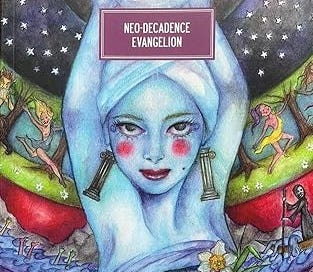New Visions of Excess: Neo-Decadence Evangelion, edited by Justin Isis
Eleven fiction pieces from the international Neo-Decadence movement.
The Neo-Decadence movement is a loose collective of international authors inspired, as the name implies, by the excess of the original decadence movement. The stories in this anthology often include aspects of genre fiction, non-traditional narrative structures, and themes of self-destruction, social satire, and alienation.
“The Slug” by Brendan Connell opens the collection. It’s written as a prose poem that alternates between a narrative of a man named Dino whose body, life, and relationships degrade quickly, but he finds himself becoming happier and happier the more grotesque he becomes, and surreal verses with themes of rot and destruction.
Some carnivorous fish; a city on fire.
It sets the tone for the anthology well. It focuses on an inversion of moral and aesthetic ideals in which the greatest forms of happiness and beauty are found in debasement. Only when Dino is reduced to a living slug of a man does he truly become happy.
“A Tree Rotting from the Top Down” by Justin Isis is about a young Japanese man named Kousuke who has made it his goal from childhood to destroy a doctor named Kawamoto due to a petty slight. While he excels in school, his cruel nature manifests in an incestuous relationship with his sister Aki, eventually driving her to an attempted suicide and a stay in a mental hospital.
Their lives culminate in Kousuke’s wedding to a young woman, part of his veneer of social respectability, where he humiliates the doctor under the guise of praise. The story ends with Kousuke and Akin in a conversation with a man named Mori who encourages both to go into finance, as he believes making money and becoming rich are the only true purposes in life.
“Your internal world is not real. When you realize this, all problems disappear. Every time you feel upset or lacking energy, just take a small action right towards increasing your financial status. You’ll work a lot harder if you assume everyone else is working harder than you are. Then you’ll be on the path to renunciation.”
Despite the contrast between Kousuke and Aki, one being a social climber and the other wasting from mental illness and self-destructive behavior, both are shielded by their privileged background. The two are destined to rise to the top of Japanese society, despite their deep-rooted problems. One can only imagine the destruction they’ll cause there.
Gaurav Monga’s “The Costume” is about an Indian man named Feroz who chooses to wear only Pathani suits his whole life, and nothing else. This goes from making him seem somewhat eccentric, to a fashion icon to the privileged, to being actively despised when the Pathani suit becomes unfashionable.
Feroz holds a monomania for his suits. He practically builds his whole life around it. His own vision of himself in his suits drives everything, even at the expense of all other parts of his existence.
“Baphomet’s Ballroom” by LC von Hessen is a hilarious satire of the contemporary New York art scene told in second person. A barista moonlighting as a journalist goes to a Satanic themed performance gallery show filled with trendy asswipes. This story deftly skewers social climbing dilettantes and the bullshit that struggling artists need to deal with when around them.
James Champagne’s “Providence Spleen” is another funny satirical work. It follows the thoughts of a pseudo-intellectual “anti-woke” writer as he visits Providence, Rhode Island, complains about everything, and struggles to work on a piece for Neo-Decadence Evangelion. There’s obviously a bit of self-deprecation going on, which keeps the story somewhat grounded. However, the way it mocks the whining often heard from writers who spend too much time on Twitter is hilariously mean-spirited.
“A Night of Amethyst” by Damian Murphy is one of the most interesting stories in the book. It’s written in the form of a play through of a text-based video game. The player explores a mysterious institution where old poets live filled with strange machines. The imagery becomes more fantastic as the “game” progresses and the computer becomes more hostile. It’s one of the most unique experiences that I’ve had reading a story recently.
>help
It’s a little late in the game for that, nicht wahr?" In any case, as you’re perfectly aware, the “help” command is not a distress signal. You got yourself into this situation and you must find your own way out.
I think this is a great anthology. Every piece in it feels completely different and unique to the author, even when many of them come back to similar themes. I’d been familiar with some of the authors, but it introduced me to some new ones who I look forward to reading more from. This is an excellent introduction to a very promising movement in contemporary literature.




